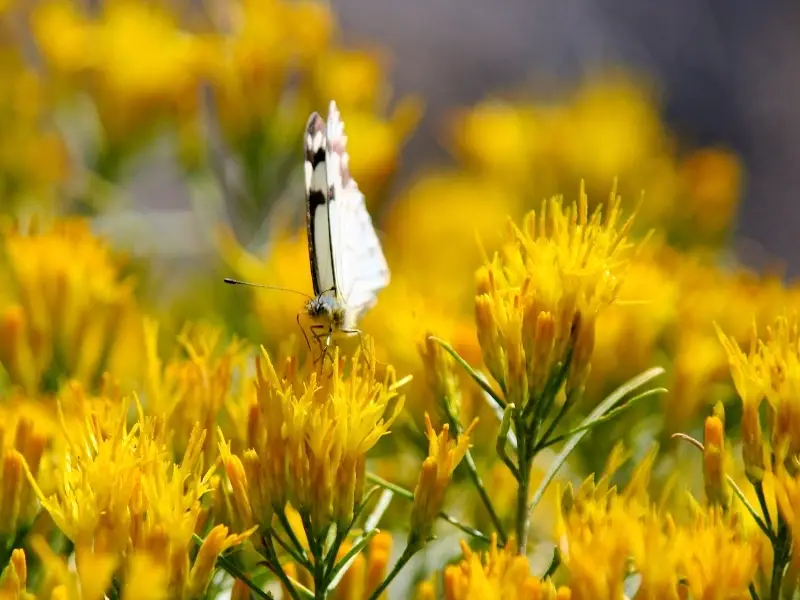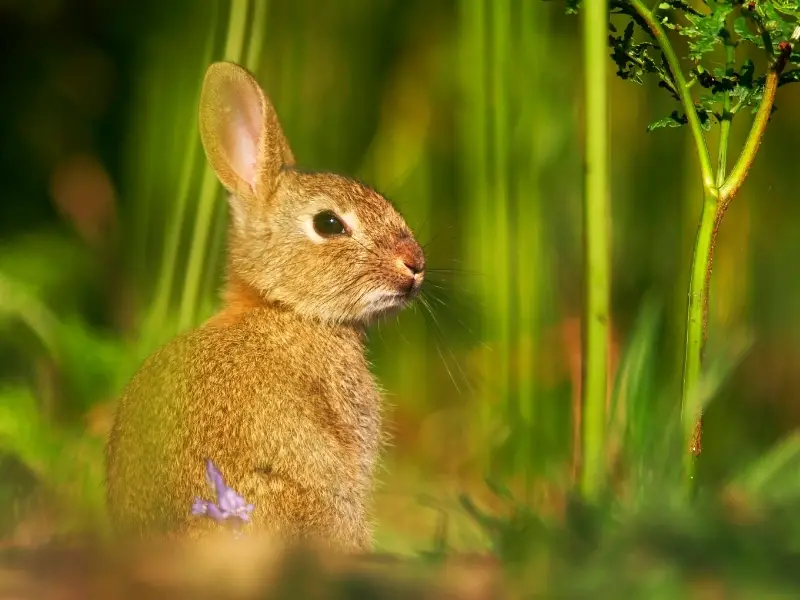A rabbit’s diet mostly consists of leafy greens, vegetables, hay, and pellets. What about insects? Do these critters have a place in a rabbit’s diet? Is it different for pet rabbits versus rabbits in the wild that coexist with bugs?
While rabbits can eat insects, it’s mostly by accident. Wild rabbits don’t actively go looking for critters to eat. If there’s an insect on a leaf and the leaf looks yummy to the bunny, the insect may be eaten. For domesticated rabbits, you don’t need to worry about buying insects to feed your bunny.
Let’s look further into rabbits and insects and whether rabbits are able to eat these critters.
Is It Safe for Rabbits to Eat Bugs?
It isn’t safe for rabbits to eat bugs. Here are the reasons why:
Hindgut Digestive System
Firstly, rabbits are herbivores. This means that they eat a plant-based diet comprising hay, vegetables, and leafy greens. These small mammals also need fiber to thrive and survive, and rabbits get the fiber they need from leaves and grass.
Insects are a good source of protein, but rabbits don’t need protein to survive. Plus, rabbits have a hindgut digestive system that is optimized to process fiber, not protein. So if a rabbit eats an insect, it won’t be because it looks delicious.
Not a Predator
Rabbits also aren’t predators. Instead, they are prey animals. Thus, they won’t hunt and kill other animals or insects for that matter or for any purpose. Insects generally are fast-moving creatures, and it will take skill and a predator instinct to hunt and eat these critters.
If the insects are small, like aphids for example, then a rabbit can safely eat them. This isn’t to say you should go find aphids to feed to Ms. Fluffles.
Poison and Diseases
There is also the case of poisonous insects. Examples include poisonous spiders, blister beetles, the bullet ant, some moths, scorpions, and centipedes. Bunnies don’t have a strong immune system, so ingesting this poison could be deadly.
On the same note, it’s well-known that cockroaches carry diseases. So should your rabbit who has a weak immune system happen to swallow a cockroach … Well, you can just imagine that it won’t go well and your bunny will get sick or die.
Small Throats
The other problem with rabbits eating bugs is that they have small throats. Beetles and cockroaches, for example, have a tough exterior shell and can become a choking hazard.
Internal Blockages
Lastly, a rabbit’s digestive system is quite delicate. While tiny insects can pass through quite easily, the same can’t be said for larger insects. Should a bunny eat and swallow a large bug, it can cause an intestinal blockage, which can be deadly.
Are There Any Kind of Insects a Rabbit Can Eat?
This is kind of a moot point since rabbits should not be eating insects.
However, some insects and rabbits may share food sources, like plant leaves, bark, stem, edible flowers, fruits, etc. Thus, a rabbit may accidentally eat a bug that’s stationary and sitting on what the bunny considers as food.
How Do You Keep Your Rabbits From Eating Bugs?

There are a few ways you can keep your pet rabbit from accidentally eating insects:
Prevention 1: Move Your Rabbit Indoors
While insects can still be found inside your home, there is a lower chance of your rabbit and an insect crossing paths inside compared to outside.
For your rabbit’s exercise area, you could set up an exercise pen outside and place it in a bug-free zone.
Prevention 2: Bug-Proof the Hutch
There may be some non-poisonous spiders or other insects that can make it inside your bunny’s hutch. In general, your pet rabbit may not pay any attention to these insects, provided they stay away from your bunny’s food.
If you are worried about wood carpenter ants that can bite your bunny (ouch!), poisonous spiders and insects, and disease-carrying critters, follow these steps:
- Look for any dark corners that could become hiding spots or nesting sites for these bugs to make their home.
- Seal up any cracks or seams in the hutch with glue, silicon, or tape.
- Create a barrier by smearing petroleum jelly around the hutch to keep the ants away.
Prevention 3: Buy Quality Rabbit Food
To keep your bunny away from insects, ensure there are none in or on their food. Buy your hay from trusted brands and inspect veggies and leafy greens for insects before placing these inside your rabbit’s food bowl. Ensure you feed enough to prevent your bunny from being hungry and supplementing their own diet.
Prevent 4: Clean, Clean, Clean
Cleaning your house and spraying it with bug spray is a good way to get rid of insects, and thus, to keep them away from your rabbit. Or should that be to keep your rabbit away from the insects?
Prevention 5: DE Your Garden
If your rabbit spends a lot of time in your garden and eats leafy greens, then a way to keep the critters away is to dust these plants with food-grade Diatomaceous Earth (DE). This powdery substance is made from fossilized algae sediment, called diatoms, that’s extracted from the earth.
DE will help decrease the insect population in your garden since the powder has dehydrating properties. This is extremely effective against exoskeletal insects, like earwigs, ants, lice, crickets, centipedes, pillbugs, mites, fleas, most beetles, and more.
Fewer insects around means that there is a decreased chance that Mr. Fluffles will accidentally eat an insect (or two).
Nutritional Tips for Your Rabbit
Insects have no place in a rabbit’s diet. To ensure your bunny gets optimal nutrition from its food, provide your bunny with:
Water
Fresh drinking water should be placed inside the bunny’s cage daily. Without water, your bunny will dehydrate and die.
Fiber
Rabbits need a fiber-rich diet. Feeding your bun lots of grass hay provides it with the fiber needed.
Leafy Greens
Ensure your rabbit eats plenty of leafy greens such as green peppers, Bok Choy, watercress, kale, romaine lettuce, Brussel sprouts, broccoli, herbs like mint, parsley, and chicory, and the leafy parts of spinach, chard, carrots, mustard, and beetroot.
Fruit and Veggies
This shouldn’t be the main part of your rabbit’s diet; however, you can add these as treats 2-3 times a week. Never give your bun more than a tablespoon of fruit or veggies that are sugar-rich.
Pellets
Your rabbit also needs some pellets, especially when they are younger. Choose a Timothy-based pellet that has added fiber.
Conclusion
Being a responsible rabbit pet owner is all about knowing what your bunny should be eating and what it should be avoiding. If Ms. Fluffles accidentally ate a cricket or aphid, there is no need for concern.
But you can insect-proof your home by keeping it clean and regularly inspecting your rabbit’s cage or hutch for uninvited guests. Lower the insect population in your garden by dusting DE on plants that have just been watered. Be sure to only buy quality hay for your rabbit and wash all fruit and leafy greens to ensure it is insect-free.
Related Articles:

